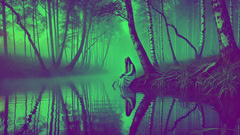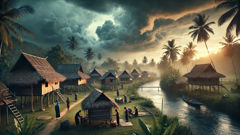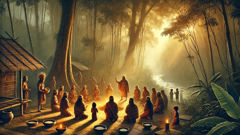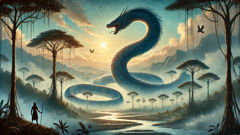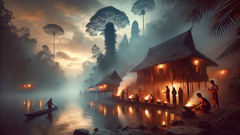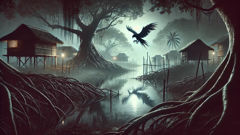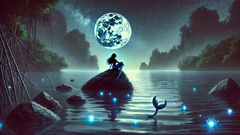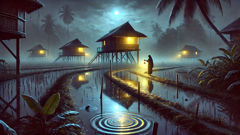Introduction
Mist clings to the forest floor, curling around birch trunks like the memories of lost souls. The Volga River winds through the heart of old Russia, its banks shrouded in an ancient silence broken only by the calls of distant nightjars and the hush of water against stone. Here, where the woods are dense and shadows grow deep, folklore is not just told—it is lived. Every gust of wind carries whispers from centuries past, and every rustle in the reeds might belong to something not quite human. Villagers keep to the narrow paths, clutching talismans and muttering prayers, for they know the stories: spirits haunt the wilds. Among them, none are more feared—or more sorrowfully remembered—than the Rusalka. She is both beautiful and terrible, a specter born of heartbreak and violence, drifting between worlds. They say she was once a maiden, vibrant and full of hope, until betrayal and blood bound her to the cold river’s embrace. Now, she waits in the twilight, hair glimmering like riverweed, singing songs that lure the unwary to a watery grave. Yet in the echo of her legend, there lies a human ache: the yearning for lost love, for justice, for the warmth of life denied. This is the story of the Rusalka—a tale that winds through tangled forests and silent waters, where grief and beauty are inseparable, and the line between vengeance and longing blurs with the river’s shifting current.
The Woodsman’s Sorrow
Ivan Petrovich was a man carved by the wilderness. His home—a rough-hewn cabin of pine and larch—stood alone where the forest pressed thick against the Volga’s gentle bend. He lived by the axe and the net, and his hands bore the scars of both. The villagers in nearby Staraya Sloboda called him the silent one, for Ivan spoke little and smiled even less, especially since the winter that had stolen his beloved, Katya, beneath drifts of bitter snow. Grief, sharp as the north wind, had hollowed him. Each dawn, Ivan walked the river’s edge, hoping to find solace in its ceaseless motion. The river remembered her: Katya had danced here, her laughter bright as sunlight on ripples, her hair catching the wind. Now, silence had settled—a silence Ivan filled with work, with mending nets and splitting wood, never daring to look too long at the water for fear of what memories it would stir. But that spring, as the thaw returned and the willows dripped with green, rumors began to ripple through the village. Livestock vanished from riverside pastures. Young men who wandered too close to the water at dusk returned pale and trembling, eyes wide with secrets they wouldn’t share. Fishermen muttered of a pale shape gliding beneath the surface, hair trailing like weeds, eyes shining in the gloom. Old women shook their heads and spat over their shoulders. 'The Rusalka has awakened,' they whispered. Ivan tried to dismiss it as superstition, yet unease gnawed at him. Nights brought strange dreams: Katya’s voice, calling from across the water; a silvery figure beckoning just beyond reach; the icy brush of fingers against his cheek. One evening, as dusk bled into night, Ivan followed a haunting melody through the willows. The song was both familiar and strange—a lullaby Katya once sang, now threaded with sorrow. Drawn as if by a spell, he found himself at the riverbank, where mist swirled above the black water. There she stood. The Rusalka’s hair shimmered with an unnatural green luster, skin pale as moonlit snow. Her eyes were deep and sorrowful, rimmed in shadow. She sang, her voice the color of longing. Ivan froze, heart thundering. The spirit’s gaze met his, and for a moment the world held its breath. Then she vanished, dissolving into mist and river. Ivan stumbled home, shaken to his core. That night, the dreams returned—clearer now. He saw a young woman, betrayed and drowned; saw her rising, reborn in sorrow and rage. He saw himself, standing on the threshold between life and death, the river calling him by name. As the days passed, Ivan felt a strange compulsion growing, a need to understand the Rusalka’s sorrow and break her curse. He spoke with the babushkas who remembered the old tales. They told him: a Rusalka is born from a woman’s violent death, especially in love—a soul denied rest, doomed to haunt water and lure others to her fate. 'If you seek her,' they warned, 'bring an offering. Show her kindness, not fear. But beware—her grief is a hunger.' Ivan gathered wildflowers and weavings Katya had made, setting them at the river’s edge. Each night he returned, listening for the Rusalka’s song. Each time she appeared—sometimes close, sometimes far—her sorrow pressed against his chest like a weight.
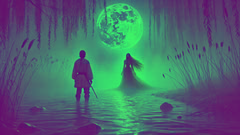
The Song Beneath the Water
With each night, Ivan’s resolve grew stronger, but so did the sense of something ancient watching him from beneath the river’s surface. He wondered if this was love’s echo or something deeper—a force that bound spirit to water and man to fate. One stormy evening, as thunder rolled and rain lashed the trees, Ivan sat by his hearth, staring at the flickering fire. The wind howled outside, and the river swelled with rain. Suddenly, a voice—soft as falling water—drifted through the cracks in the cabin’s walls. The melody was unmistakable: the Rusalka’s song, calling him to the river once more. Against all reason, Ivan donned his cloak and stepped into the tempest. The world was awash in shadows and silvery rain. The Volga had burst its banks, churning darkly beneath a sky streaked with lightning. Ivan waded through mud and brambles, drawn by the music. He reached the water’s edge, where the river foamed around twisted roots. There, the Rusalka waited—her hair tangled with river grass, her dress billowing like a drowned maiden’s shroud. She wept as she sang, and her tears became part of the river itself. Ivan knelt before her, voice trembling: 'Why do you sing, spirit? What do you seek?' The Rusalka gazed at him with endless sorrow. 'I seek what was stolen—a life, a promise broken, a heart undone.' Her story unfurled in fragments. She had been Marina Ivanovna—a miller’s daughter, beloved of a young hunter who never returned from war. Spurned by her father’s chosen suitor, she had fled to the river in despair. There, in the black water, she met her end—whether by her own hand or by the violence of another, even she no longer remembered. But her pain endured, binding her soul to the river, transforming her into the Rusalka. 'I am both memory and hunger,' she whispered. 'Each night I call, hoping to be heard—hoping to find peace or retribution.' Ivan listened, heart aching. He offered her the flowers and Katya’s weaving, letting them drift on the current. For a moment, the Rusalka softened—her eyes lost some of their pain. The wind died, and the river stilled. Yet as Ivan reached for her hand, she recoiled, her sorrow twisting into something darker. 'Beware, mortal,' she said. 'My curse is not so easily broken. The river takes as it gives.' As dawn crept across the sky, the Rusalka faded, leaving Ivan alone amid the hush of receding rain. But something had changed. The forest felt less oppressive. The river, less cold. Ivan sensed that by seeing her pain, he had begun to unravel the curse’s knot. Days passed in uneasy peace. Ivan returned to his chores, but each night he visited the river, laying offerings and speaking softly into the mist. The Rusalka grew less hostile, her song turning mournful rather than vengeful. The villagers noticed: their cattle no longer vanished; the men who strayed by the river came home unharmed, though they spoke of dreams filled with weeping and silver hair.
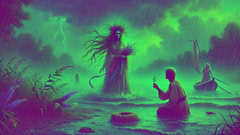
The Shadow’s Bargain
As summer deepened, Ivan found himself at a crossroads. He sensed that mere sympathy would not suffice—the Rusalka’s pain was rooted in injustice unresolved. One evening, he ventured to the village elder, Darya Stepanovna, famed for her wisdom and fierce memory. In her hut, thick with the scent of dried herbs and smoke, Ivan told her all: the dreams, the offerings, the spirit’s sorrow. Darya nodded gravely. 'A Rusalka cannot rest until her story is spoken and her wrongs redressed,' she said. 'But beware—her vengeance is cunning, and her hunger is old.' She handed Ivan a woven charm of rowan and nettle, said to ward off the dead. 'Go to her at moonrise. Ask her what she wants most—redemption or revenge.' That night, Ivan returned to the riverbank beneath a sky awash with silver light. The Rusalka waited among the reeds, her hair swirling like kelp in unseen currents. 'Marina Ivanovna,' Ivan called gently. 'What do you seek—peace or retribution?' The Rusalka’s face twisted in anguish. 'I wish for justice,' she murmured. 'My killer walked free; my love was lost; my name forgotten.' Her words echoed through the night like a cold wind. Ivan promised to seek the truth of her death and honor her memory so her soul might rest. The Rusalka’s song softened, and she placed a cold hand on his cheek—a fleeting touch that felt like river water on stone. In the days that followed, Ivan scoured the village for clues. He spoke to elders who remembered Marina’s disappearance. Bit by bit, the truth emerged: the jilted suitor, jealous and desperate, had chased her into the river. Guilt had haunted him until he too vanished into the forest, never to be seen again. Ivan gathered this story and, one evening, returned to the riverbank with the villagers in tow. There, he recited Marina’s fate aloud, naming her killer, mourning her loss, and laying flowers on the water. The air shimmered as if the river itself wept. For the first time, the Rusalka’s song turned gentle—a lullaby for those who had passed too soon. The curse began to lift. The river felt warm again, its banks no longer haunted by shadows. Yet as Ivan knelt to say his final farewell, the Rusalka appeared one last time—her face radiant with gratitude and sorrow. 'You have given me peace,' she whispered, 'but you carry my memory now.' She pressed a kiss to his brow—icy, yet filled with an odd warmth—and vanished into the mist, leaving Ivan alone but transformed. From that day forward, Ivan found himself changed. He no longer feared the river or its ghosts. He tended Marina’s memory with quiet devotion, telling her story to those who would listen. The villagers, too, remembered—and honored—the girl lost to the water but saved by compassion. The legend of the Rusalka lived on: a warning and a lament, but also a testament to the power of empathy and remembrance.
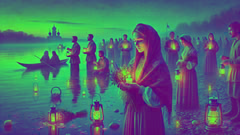
Conclusion
The Volga runs on as it always has, its waters carrying stories as much as silt and rain. The forest, too, endures—its shadows deepening at dusk, its silence broken by the calls of birds and the distant echo of remembered songs. Ivan lived out his days in quiet peace, no longer haunted by grief but enriched by what he had learned: that sorrow, when seen and honored, need not become vengeance; that even spirits shaped by violence can be soothed by compassion; that every soul—lost or living—deserves to be remembered. The villagers no longer feared the river’s edge at twilight. Instead, they left small offerings: ribbons, wildflowers, pieces of bread for birds and spirits alike. The story of Marina Ivanovna—the Rusalka—became a tale told to children on stormy nights and whispered by lovers walking beneath moonlit willows. In honoring her name, they honored all those who have known sorrow and found solace in remembrance. So if you ever find yourself by a Russian river at dusk, listen closely to the wind in the reeds. Perhaps you’ll hear a song—a memory lingering just beyond sight, a reminder that every legend is born from longing and that sometimes, even restless spirits can find peace.

